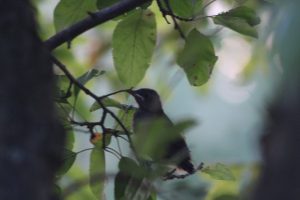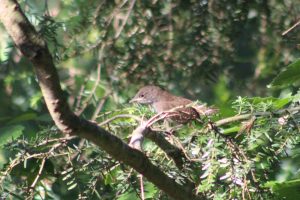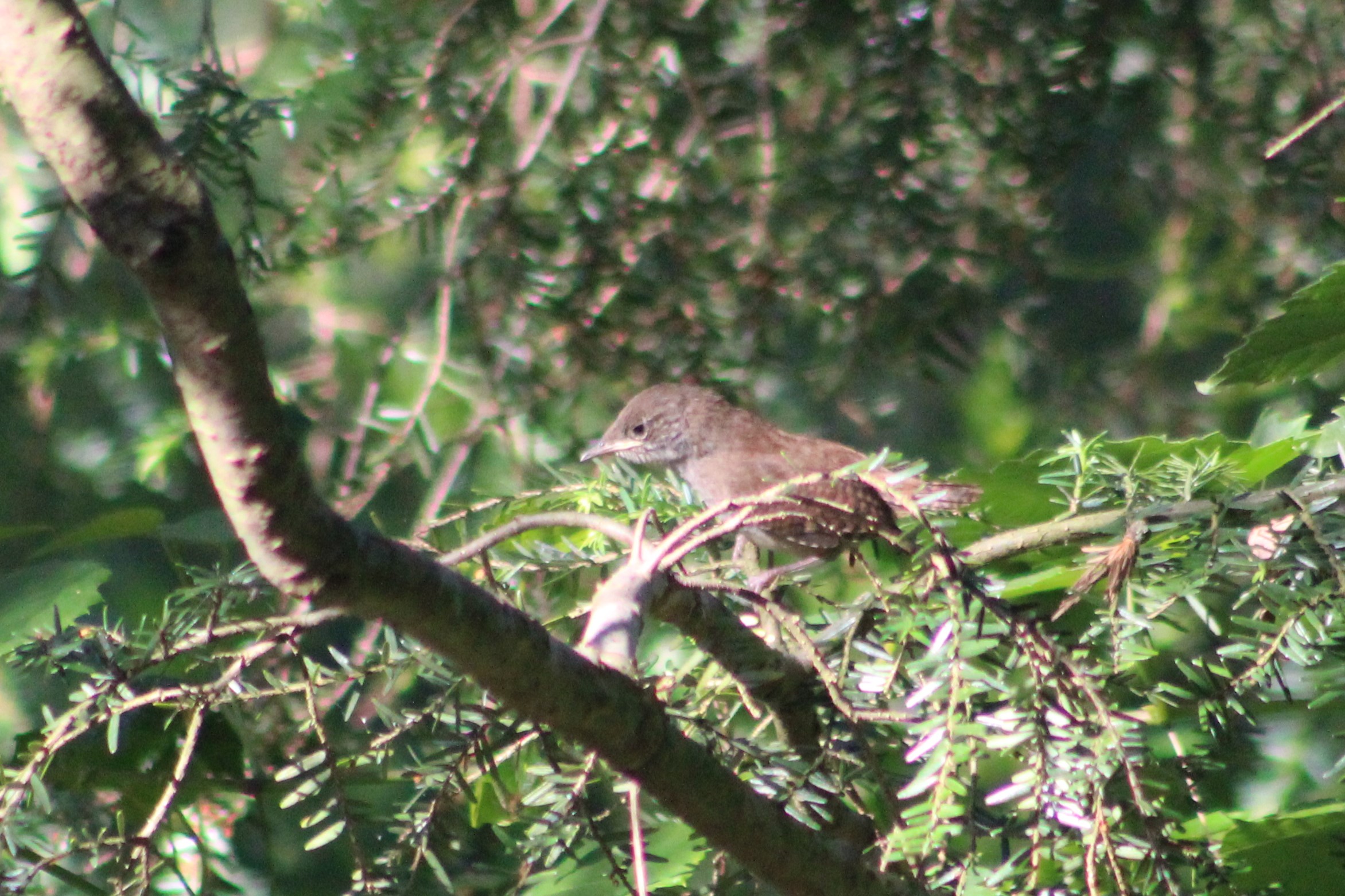The movie Finding Nemo got it right when they gave the voice of the young laughing gull an irritating, “ME, ME, ME.” Baby birds, in fact almost any animal that requires the care of their parent, are selfish, self-centered, and annoying. Each species of altricial (cannot care for itself at birth) bird has a way to solicit food from their parent.
Several times today, I heard the house wren Geiger counter clicking away, growing louder and faster as food approached.
The baby house wrens came off the nest and now drift around begging for food from their frantic parents. It sounded like there were at least four young competing for attention. The fledglings begging is a series of ticks and clicks reminding me of a Geiger counter. When I listen closely, I recognize that it has a very similar pattern to the adult house wren’s song, but it is far from musical. I describe the adult song as burbling; happy, cheerful, bubbles. I have seen other people describe the song as energetic, effervescent, and enthusiastic.
Throughout my lunch break, the baby house wren Geiger counter ticks away, growing louder as food approaches and goes silent as the food disappears down its throat. The risk these babies take in their frenzied effort to secure food! They make noise almost constantly and chase the parent around while sitting on conspicuous perches, a sure notice to the parent—I am here. It also serves notice to potential predators. It is a wonder any survive.
As I step off the deck to get a better look at the wrens, a young bird shoots out into the nearby tree. I notice a gray catbird paying attention to this new baby. But, the baby is not a catbird, it is a brown-headed cowbird, a nest parasite. Why doesn’t the catbird parent recognize this is not my kid? In addition to the noise  a baby bird makes, it has a visual clue. Baby birds have huge “lips,” actually their beak is still soft and brightly colored. When they open their mouth, it too is brightly colored. The cowbird takes advantage of the instinctive reaction of a parent bird to stuff food into a colorful open mouth, any mouth, of a begging bird. Another signal for food includes wing quivering. The baby bird shakes with excitement as the parent approaches, opens its mouth wide and frantically calls—feed ME!
a baby bird makes, it has a visual clue. Baby birds have huge “lips,” actually their beak is still soft and brightly colored. When they open their mouth, it too is brightly colored. The cowbird takes advantage of the instinctive reaction of a parent bird to stuff food into a colorful open mouth, any mouth, of a begging bird. Another signal for food includes wing quivering. The baby bird shakes with excitement as the parent approaches, opens its mouth wide and frantically calls—feed ME!
During this period of baby feeding, the parent or parents work really hard to ensure the survival of their progeny. The feeding process goes something like this. Parent after finding food approaches the area where the babies hang out. They babies scream and yell, “Me, Me” in their language. The parent sees an open mouth and stuffs in food. The baby swallows as the parent goes  for more. When the parent returns, it looks for the baby with the open mouth and begging. In goes the food.
for more. When the parent returns, it looks for the baby with the open mouth and begging. In goes the food.
Many birds lay their eggs in synchrony. The first egg laid will hatch prior to the second and therefore the first bird to hatch will be slightly bigger and hungrier. If the parent has a good territory with lots of food, baby bird one gets fed first, not by design, but by the fact that it is bigger and louder. Once baby one is satisfied, it quiets down and baby two gets fed and so on down the line. The last bird to hatch in often starved to death by its hungry siblings. It sounds cruel, but if the parent were “fair,” all of the birds might not get enough food and have a weakened chance for survival. This way the first bird to hatch has a much greater chance of reaching adulthood. Since the cowbird incubation period is shorter than most birds, its eggs hatch first. The host parent is duped into feeding the cowbird baby, never recognizing it as an imposter.
Within a fairly short time, the young birds need to learn how to feed on their own, weaned of a dependence on their parents. When that happens, the noise stops. A couple weeks ago, the Carolina chickadee babies whined and begged for food from their parents. Now, they are on their own and silent.
This early in the season, a male house wren might be able to attract another female and thereby have two broods, so while the baby’s begged and the female and presumably the male on occasion stuffs food in their mouths, I can hear a couple males having a song battle. After weeks of sparse singing, these birds have ramped up their concert in an effort to produce as many progeny as possible.
On any walk at this time of the year, listen carefully for the sound of baby birds and enjoy watching the parent/baby interaction.


We had a rose-breasted grosbeak pair last year with a very noisy fledgling that followed them to the bird feeder and perched while constantly squawking to be fed. My daughter and our two-month-old granddaughter were living with us at the time, and I mused that though we were all exhausted from living with an infant, at least she only cried occasionally!